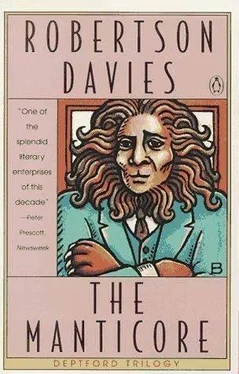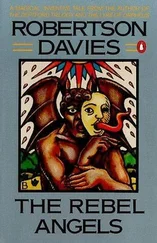This was not what Mr. Pugliesi said in the Art Club at school. We had a lot of clubs, and the Art Club had rather a cachet, as attracting the more intellectual boys; you were elected to it, you didn't simply join. Mr. Pugliesi was always warning us not to look for messages and meanings but to take heed of the primary thing – the picture as an object – so many square feet of painted canvas. Messages and meanings were what Father Knopwood chiefly sought, so I had to balance my ideas pretty carefully. That was why he got after me for laughing at the Boy Scout picture. He agreed that it was an awful picture, but he thought the meaning redeemed it. Thousands of boys would understand it who would never notice a Raphael reproduction if we put one in its place.
I have never been convinced that he was right, and was shocked by his idea that not everybody needed art to be educated. He saved me from becoming an art snob, and he could be terribly funny about changes in art taste; the sort of fashionable enthusiasm that admires Tissot for thirty years, kicks him out of the door for forty, and then drags him back through the window as an artist of hitherto unappreciated quality. "It's simply the immature business of assuming that one's grandfather must necessarily be a fool, and then getting enough sense to realize that the old gentleman was almost as intelligent as oneself," he said.
This was important to me because another kind of art was coming to the fore at home. Caroline, who had always had lessons on the piano, was beginning to show some talent as a musician. We had both had some musical training and used to go to Mrs. Tattersall's Saturday morning classes, where we sang and played rhythm instruments and learned some basic stuff very pleasantly. But I had no special ability, and Caroline had. By the time she was twelve she had fought through a lot of the donkey-work of learning that extraordinarily difficult instrument that all unmusical parents seem to think their children should play, and she was pretty good. She has never become a first-rate pianist, but she is a much better than average amateur.
When she was twelve, though, she was sure that she was going to be another Myra Hess and worked very hard. She played musically, which is really quite rare, even among people who get paid big fees to do it. Like Father Knopwood, she was interested in content as well as technique, and it was always a puzzle to me how she got to be that way, for nothing at home encouraged it. She played the things young pianists play – Schumann's The Prophet Bird and his Scenes from Childhood , and of course lots of Bach and Scarlatti and Beethoven. She could wallop out Schumann's Carnaval with immense authority for a girl of twelve or thirteen. The mischievous little snip she was in her personal life seemed to disappear, and somebody much more important took her place. I think I liked it best when she played some of the easier things she had learned in earlier years and fully commanded. There is one trifle – I don't suppose it has much musical value – by Stephen Heller, called in English Curious Story , which is a very misleading translation of Kuriose Geschichte ; she really succeeded in making it eerie, not by playing in a false, spooky way, but by a refined, Hans Andersen treatment. I loved listening to her, and though she tormented me horribly at other times, we seemed to be able to reach one another when she was playing and I was listening, and Netty was somewhere else.
Caroline was glad to see me at weekends, because the house was even gloomier than before our mother died. It wasn't neglected; there were still servants, though the staff had been cut down, and they polished and tidied things that never grew dim or untidy because nobody ever touched them; but the life had gone out of the house, and even though its former life had been unhappy, it had been life of a kind. Caroline lived there, supposedly under the care of Netty, and once a week Father's secretary, an extremely efficient woman from Alpha Corporation, called to see that everything was in good order. But this secretary didn't want to be involved personally, and I don't blame her. Caroline was a day-girl at Bishop Caimcross's, so she had friends and a social life there, as I did at Colbome College.
We rarely asked anybody home, and our first attempt to take over the house as our own soon spent itself. Father wrote letters now and then, and I know he asked Dunstan Ramsay to keep an eye on us, but Ramsay had his hands full at the school during those war years, and he didn't trouble us often. I rather think he disliked Carol, so he confined his supervision to questioning me now and then at school.
You might suppose my sister and I were to be pitied, but we rather liked our weekend solitude. We could lighten it whenever we pleased by going out with friends, and people were kind about inviting us both to parties and such things, though during the war they were on a very modest scale. But I didn't want to go out much because I had no money and could get into embarrassing positions; I borrowed all I could from Carol but didn't want to be wholly in her clutch.
What we both liked best were the Saturday evenings when we were together, because it had become the custom for Netty to devote that time to her pestilent brother Maitland and his deserving young family. Carol played the piano, and I looked through books about art which I was able to borrow from the school library. I was determined about this because I didn't want her to think that I had no independent artistic interest of my own, but as I looked at pictures and read about them, I was really listening to her. It was the only time the drawing-room showed any hint of life, but the big empty fireplace – the secretary from Alpha and Netty agreed that it was foolish to light it during wartime, when presumably even cord-wood was involved in our total war effort – was a reminder that the room was merely enduring us, and that as soon as we went to bed a weight of inanition would settle on it again.
I remember one night when Ramsay did drop in, and laughed to see us.
"Music and painting," said he; "the traditional diversions of the third generation of wealthy families. Let us hope you will both become discriminating patrons. God knows they are rare."
We didn't like this, and Carol was particularly offended by his assumption that she would never do anything directly as a musician. But time has proved him right, as it does with so many disagreeable people. Carol and Beesty are now generous patrons of music, and I collect pictures. With both of us, as Father Knopwood feared, it has become the only spiritual life we have, and not a very satisfactory one when life is hard.
Knopwood prepared me for Confirmation, and it was a much more important experience than I believe is usually the case. Most curates, you know, take you through the Catechism and bid you to ask them about anything you don't understand. Of course most people don't understand any of it, but they are content to let sleeping dogs lie. Most curates give you a vaguely worded talk about keeping yourself pure, without any real hope that you will.
Knopwood was very different. He expounded the Creed in tough terms, very much in the C. S. Lewis manner. Christianity was serious and demanding, but worth any amount of trouble. God is here, and Christ is now. That was his line. And when it came to the talk about purity, he got down to brass tacks better than anybody I have ever known.
He didn't expect you to chalk up a hundred per cent score, but he expected you to try, and if you sinned, he expected you to know what you had done and why it was sin. If you knew that, you were better armed next time. This appealed to me. I liked dogma, for the same reason that I grew to like law. It made sense, it told you where you stood, and it had been tested by long precedent.
Читать дальше












